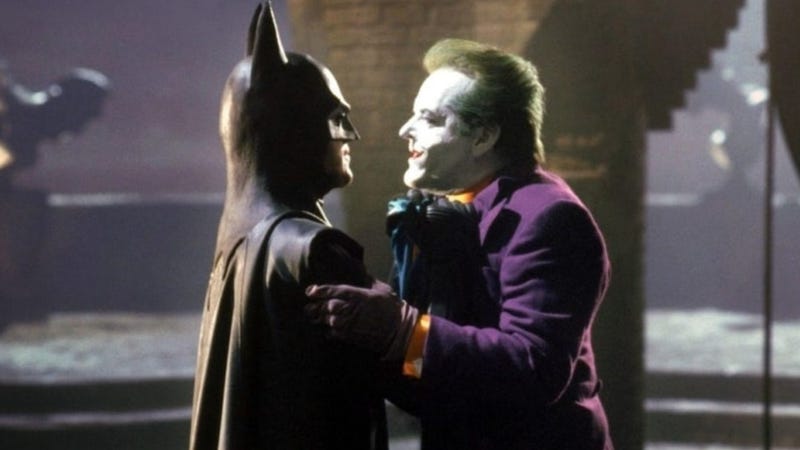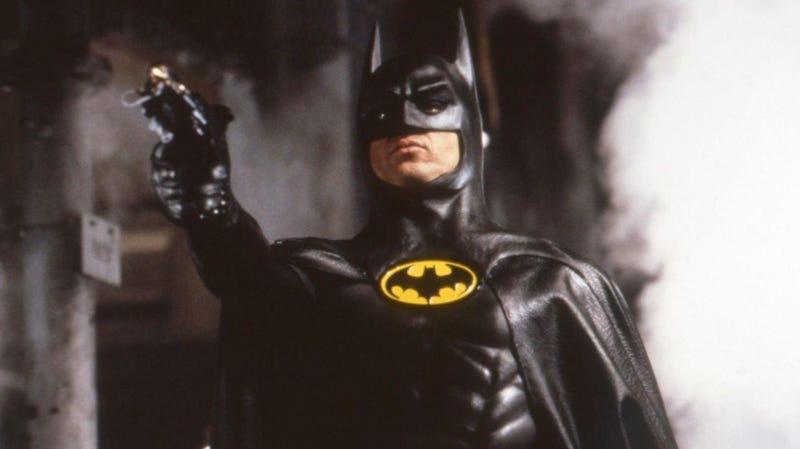Warner Bros. and DC Comics have been riding the high of Batman for decades, both in the comics and expanded media like TV, games, and film. That last one is where the character seems to do particularly well, and whose existence is plenty formative for many a viewer. But whichever Bat-actor one grew up with, or whatever their first piece of non-comics media with the character was, all of that exists in some way under the shadow of one specific Bat-interpretation.
Originally released on June 23, 1989, the Tim Burton-directed film is effectively ground zero for the Dark Knight’s staying power in pop culture for decades. That it was the first Batman movie since Adam West’s 1966 flick made it an event in and of itself, and a rare object of franchise filmmaking nowadays. That importance grew further once both Keaton and Jack Nicholson were locked in to respectively play Bats and Joker. Before accepting the part, Nicholson famously demanded top billing alongside his costar in promo materials, along with revenue from merchandising and a cut of the film’s earnings, which led to a subsequent take of between $US60-$US90 million, according to biographer Marc Eliot in 2013.

Batman went on to make $US411.6 million and became the year’s sixth highest-grossing film, so Nichsolson had some pretty good foresight on that end. But he, like everyone else at the time, probably didn’t predict how definitive the movie would end up being. In the smaller scope, its impact is pretty clear: without this movie, we wouldn’t have Batman: The Animated Series (which went so far as to borrow the film’s Danny Elfman-made theme for its opening), or the subsequent DC Animated Universe that defined multiple generations of superhero storytelling on TV. Likewise, you can easily feel its magic across its three sequels, each of which take suit after that first film by having fairly interesting (and often odd) swings at tone and then-established Batman canon.
As far as the larger Hollywood landscape is concerned, you can also trace our current fixation on opening box offices back to Batman. Within that first weekend, it netted $US40.9 million, breaking records established earlier in the year by Indiana Jones & the Last Crusade and Ghostbusters II.As noted by then-Salon writer Scott Mendelson in 2009, Batman “redefined just how much money a film could make over its first three days. […] It was the first mega-opening weekend for an industry that would eventually concentrate almost exclusively on those first three days as the cornerstone for a movie’s success.”

It’s Batman’s casting that’s had the greatest staying power, though. At the time, Keaton was a controversial choice since he’d mainly been known for comedy roles. The film’s success went on to show why you don’t judge a book by its cover, but that lesson has yet to fully sink in. Similar flack was directed toward the likes of Heath Ledger and Robert Downey Jr.—or hell, even current Batman Robert Pattinson—when they went on to play Joker and Iron Man, and as is the case with Keaton, the two actors’ takes on their respective characters ended up being more definitive than anyone could’ve imagined. Even setting those aside, Keaton’s successful Batman turn probably ended up inspiring other stars to take a chance and do movies outside their comfort zones.
There’ve been plenty of actors who’ve picked up the cowl (or voiced the guy picking it up) over the decades, and the spirit of 1989’s Batman has lived on through them in some way. Even so, it wasn’t until fairly recently that WB decided to dip back into that specific well: Sam Hamm and Joe Quinones’ Batman ‘89 comic set up a new post-Batman Returns continuity that allowed it to make good on threads dropped after that film, particularly Billy Dee Williams as Two-Face and Marlon Wayans as Robin. John Jackson Miller’s giving the original film a follow up with his Resurrection novel in October, and Keaton even opted to suit up once more for The Flash and Batgirl. Given how much WB likes going back to tap old wells, that relative restraint is a little surprising, but it probably speaks to how aware the studio is of Batman (1989)‘s importance that it knows not to milk that particular cow too hard.
In the same way Batman the character is incredibly important to DC and Warner Bros., Batman the movie is equally vital modern Hollywood. Even if it’s maybe not the absolute best Bat-movie (depending on the viewer), we’d all be poorer off if it didn’t exist, particularly since it’d mean losing out on a pretty great Prince soundtrack. So here’s to you, Batman (1989)—you didn’t plan on it, but you’re the grandfather of superhero movies and modern blockbuster culture.
Need more entertainment? PedestrianTelevision has launched on 9Now where you can cult classic movies and homegrown content like Eternal Family and Rostered On. Watch all that and more for free, 24/7 on 9Now.
